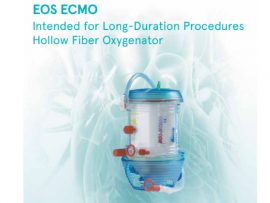Abstract Mortality in infarct-related as well as heart failure-associated cardiogenic shock remains high, reaching 40–50% depending on the etiology and severity of cardiogenic shock. Percutaneous active mechanical circulatory support devices..
Read MoreAbstract Despite immediate coronary revascularization, mortality of patients experiencing infarct-related cardiogenic shock (AMICS) remains high [1]. Over the past decade, there has been a growing interest in the use of..
Read MoreAbstract Refractory septic shock is associated with a high risk of death. Circulatory support in the form of veno-arterial extracorporeal membrane oxygenation (VA ECMO) may function as a bridge to..
Read MoreAbstract Aim Venoarterial extracorporeal membrane oxygenation (VA-ECMO) has become a common intervention for patients with cardiogenic shock (CS), often complicated by cardiac arrest (CA). Moderate hypothermia (MH) has shown promise..
Read MoreAbstract Aims This study evaluated how well serial pulse pressure (PP) and PP adjusted by the vasoactive inotropic score (VIS) predicted venoarterial extracorporeal membrane oxygenation (VA-ECMO) weaning success and clinical..
Read MoreAbstract Background Although cardiogenic shock requiring extracorporeal life support (ECLS) after cardiac surgery is associated with high mortality, the impact of sex on outcomes of post-cardiotomy ECLS remains unclear with..
Read MoreAbstract Extracorporeal membrane oxygenation (ECMO) is a cardiac or pulmonary function support system that is used in cases of refractory organ failure in addition to conventional treatment. Currently, Level I..
Read MoreAbstract Venoarterial extracorporeal membrane oxygenation (VA-ECMO) has been increasingly used to treat refractory cardiogenic shock (CS) or cardiac arrest (CA) over the past decades. Peripheral VA-ECMO increases left ventricular (LV)..
Read MoreAbstract Introduction Mortality rates in cardiogenic shock remain high, especially in patients with SCAI shock stages C to E [1].When hemodynamic status does not improve or worsens despite optimal fluid,..
Read MoreAbstract Purpose of review This article offers an overview of recent randomized controlled trials (RCTs) testing the efficacy of veno-arterial extracorporeal membrane oxygenation (VA ECMO) and microaxial flow pump (mAFP)..
Read MoreAbstract Acute myocardial infarction-related cardiogenic shock (AMI-CS) carries a dismal prognosis. Short-term mortality is in the range of 40–50% [1]. Until recently, only treatment of the culprit lesion by percutaneous..
Read MoreAbstract Over the past decade, extracorporeal life support (ECLS) has gained increasing utilization in the management of refractory cardiogenic shock (CS) with a class IIaC recommendation according to the latest..
Read MoreAbstract Predictive survival models have been proposed to esti-mate survival rates in patients with refractory cardio-genic shock considered for veno-arterial extracorporeal membrane oxygenation (VA-ECMO) [1, 2]. Notably, the Survival after..
Read MoreAbstract Purpose of review To examine the evolving landscape of cardiac surgery, focusing on the increasing complexity of patients and the role of mechanical circulatory support (MCS) in managing perioperative..
Read MoreAbstract In a recent issue of Intensive Care Medicine, we read with great interest the article by Moyon et al. [1] who retro-spectively studied the outcomes of immunocompromised patients with..
Read MoreAbstract Purpose: The outcomes of immunocompromised patients with cardiogenic shock treated with venoarterial extra‑corporeal membrane oxygenation (VA‑ECMO) are seldom documented, making ECMO candidacy decisions challeng‑ing. This study aims (1) to..
Read MoreAbstract Background: Post-cardiotomy cardiogenic shock (PCCS) remains a life-threatening complication after cardiac surgery. Extracorporeal membrane oxygenation (ECMO) represents the mainstay of mechanical circulatory support for PCCS; however, its availability..
Read MoreAbstract Background Risk-stratifying patients with (CS) is a major unmet need. The recently proposed Society for Cardiovascular and Interventions (SCAI) staging system for CS severity lacks uniform criteria defining each stage. Objectives..
Read MoreAbstract Background Women are at higher risk of mortality from many acute cardiovascular conditions, but studies have demonstrated differing findings regarding the mortality of cardiogenic shock in women and men...
Read MoreAbstract Objectives Although cardiogenic shock requiring extracorporeal life support after cardiac surgery is associated with high mortality, the impact of sex on outcomes of postcardiotomy extracorporeal life support remains unclear..
Read MoreAbstract There has been a significant increase in the use of short-term percutaneous ventricular assist devices (pVADs) as acute circulatory support in cardiogenic shock and to provide haemodynamic support during..
Read MoreAbstract The use of mechanical circulatory support using percutaneous ventricular assist devices (pVAD) has increased rapidly during the last decade without substantial new evidence for their effect on outcome. In..
Read MoreAbstract Acute myocardial infarction-related cardiogenic shock (AMI-CS) carries a dismal prognosis. Short-term mortality is in the range of 40–50% []. Until recently, only treatment of the culprit lesion by percutaneous..
Read MoreAbstract The HeartMate PHP (percutaneous heart pump) is a second-generation transcatheter axial flow circulatory support system. The collapsible catheter pump is inserted through a 14 Fr sheath, deployed across the..
Read MoreAbstract Purpose of review Discussing the rationale and current evidence for left ventricular unloading in cardiogenic shock. Recent findings Microaxial flow pumps (MFP) and intra-aortic balloon pumps (IABP) augment cardiac..
Read MoreAbstract Purpose Veno-arterial extracorporeal life support (ECLS) is increasingly used in patients during cardiac arrest and cardiogenic shock, to support both cardiac and pulmonary function. We performed a systematic review..
Read MoreAbstract Venoarterial extracorporeal membrane oxygenation (VA-ECMO) support is a lifesaving tool in cardiovascular care, providing excellent hemodynamic assistance for numerous indications, such as cardiogenic shock or periprocedural support in patients..
Read MoreAbstract Despite multimodal treatment of patients with (CS) complicating (AMI), the outcome remains poor. Large retrospective analyses and animal models suggest that (ECLS) in CS-complicating AMI improves outcome . However, to date, no assessing the..
Read MoreAbstract Objectives Symptomatic neonates and infants with Ebstein anomaly (EA) require complex management. A group of experts was commissioned by the American Association for Thoracic Surgery to provide a framework..
Read MoreAbstract Low pulse pressure (PP) in venoarterial-extracorporeal membrane oxygenation (VA-ECMO) is a marker of cardiac dysfunction and has been associated with acute brain injury (ABI) as continuous-flow centrifugal pump may..
Read More















